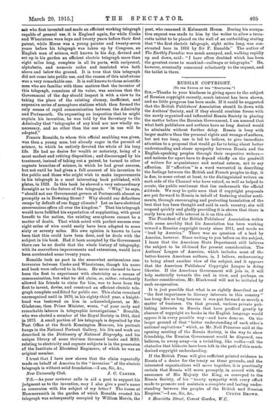RUSSIAN COPYRIGHT.
ITO vas EPITOR or MR Sth,—Thanks to your kindness in giving space to the subject of Russian copyright recently, much interest has been shown, and no little progress has been made. If it could be suggested that the British Publishers' Association should lie down with the Authors' Society, and if they should combine forces with the newly organized and influential Russia Society in placing the matter before the Russian Government, I am assured that what both publishers and authors hare so long desired would he attainable without further delay. Russia is busy with larger matters than the personal rights and wrongs of authors, but not too busy, one is led to believe, to give immediate attention to a proposal that would go far to bring about better understanding and closer sympathy between Russia and the English-speaking peoples through their respective Writers— and nations far apart have to depend chiefly on the goodwill of writers for acquaintance and mutual esteem, net to say affection. If "affection" is a word warranted in describing the feelings between the British and French peoples to-day, it is due, to some extent at least, to the distinguished writers on each aide of the Channel who have voiced, as well as helped to create, the public sentiment that lies underneath the official attitude. We may be quite sure that if copyright proposals are put forward to Russia in behalf of fostering similar senti- ments, through encouraging and protecting translation of the best that has been thought and said in each country, she will respond quickly and gladly providing it is shown that there is really keen and wide interest in it on this side.
The President of the British Publishers' Association writes with some acerbity that his Association has been working toward a Russian copyright treaty sines 1911, and needs no "lead by America." There was no question of a lead by America, however. Since writing to you before on the subject, I learn that the American State Department stilt believes the subject to be ill-timed for present consideration. The Authors' League of America, which includes moat of the better-known American authors, is, I believe, endeavouring to bring about another view of the subject, and it appears that the American Publishers' Copyright League is doing likewise. If the American Government will join in, it will help materially towards the end in view, and perhaps, on further consideration, Mr. Blackwood will not he irritated by such co-operation.
It is just possible that what is so rightly described as of "the first importance to literary interests in this country" has hung fire so long because it was put forward as merely a matter of business. On that ground, various private pub- lishing interests in Russia that have profited greatly by absence of copyright on books in the English language would oppose it in every possible way—and have done so. On the larger ground of that " better understanding of each other's national aspirations" which, as Mr. Neil Primrose said at the opening meeting of the Russia Society, is the way to allow friendship, the Russian Government would be disposed, ono believes, to sweep away—in a twinkling, like vodka—all the obstacles that hitherto have been left in the path of this much- desired copyright understanding.
If the British Press will give sufficient printed evidence to Russia of a desire for the treaty on these grounds, and the interested organizations will move together, it is practically certain that Russia will move promptly, in accord with the assurance of His Majesty the King, as conveyed to the Russia Society, of his "hearty sympathy with every effort made to promote and maintain a complete and lasting under- standing between the peoples of the British and Russian Empires."--I am, Sir, Ac., CuaTILI BROWN.
6 Henrietta Street, Covent Garden, W.C.






































 Previous page
Previous page